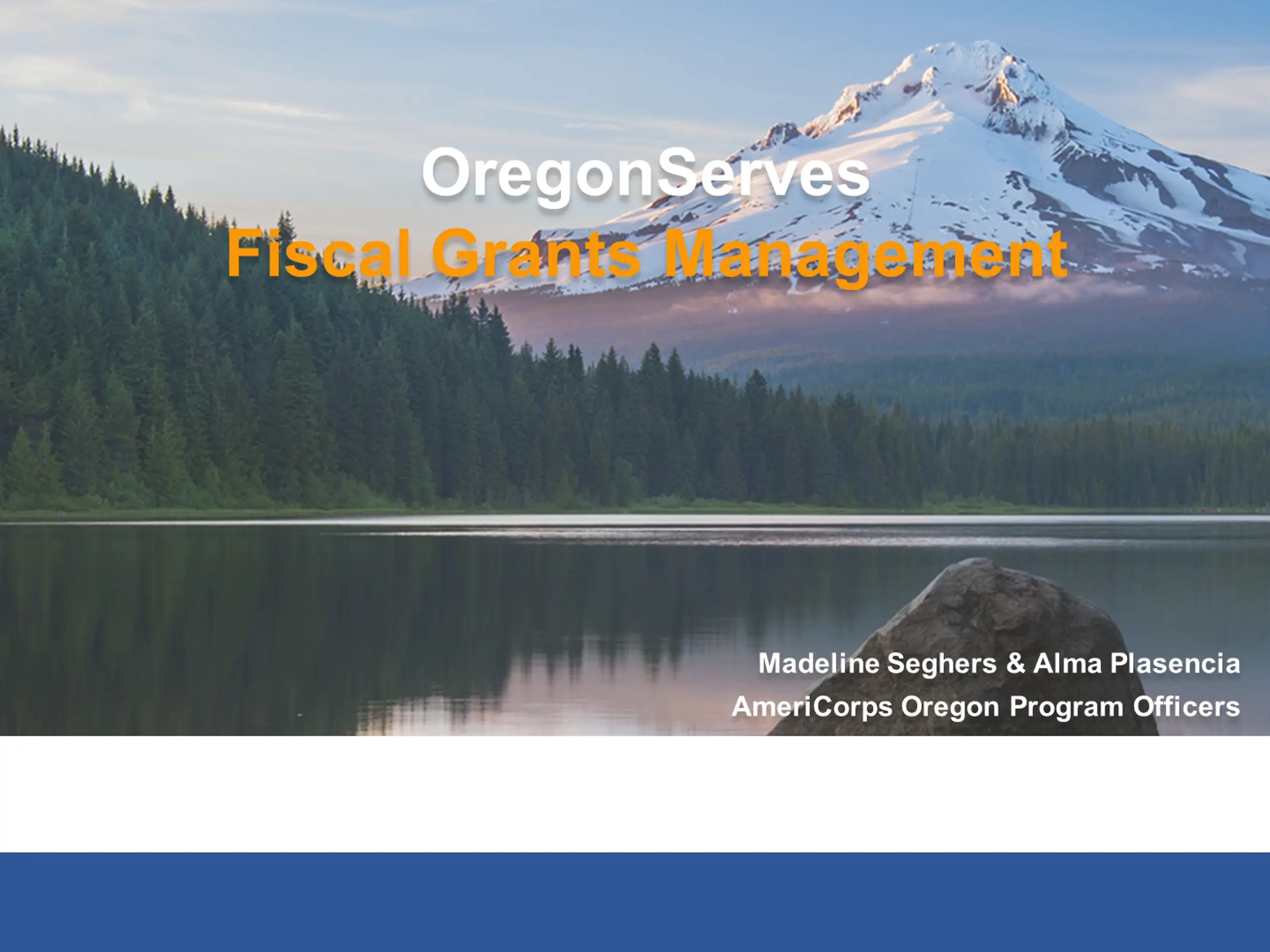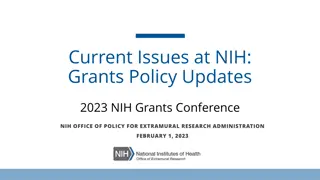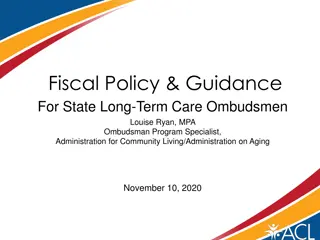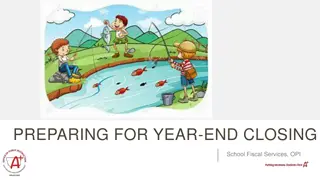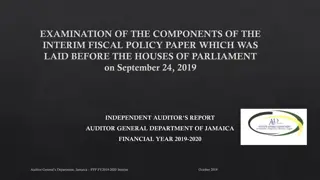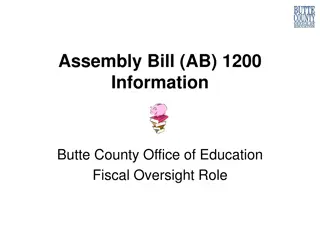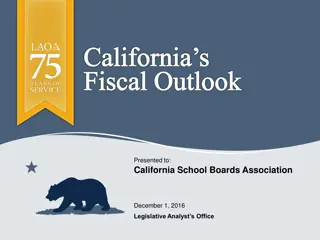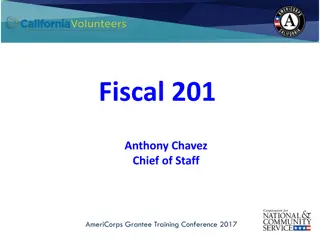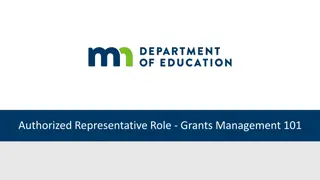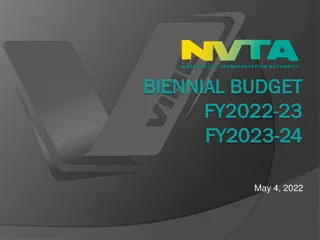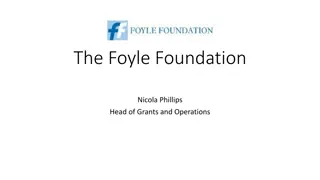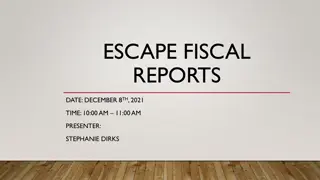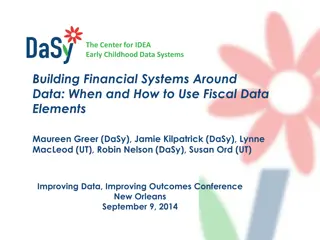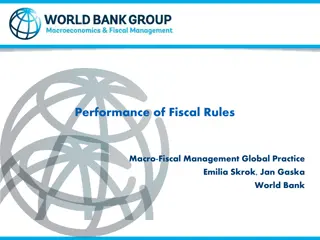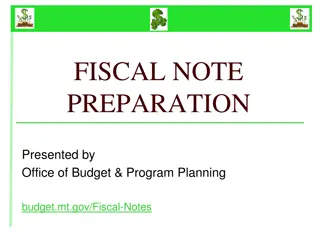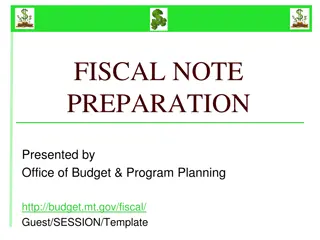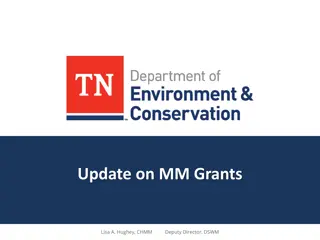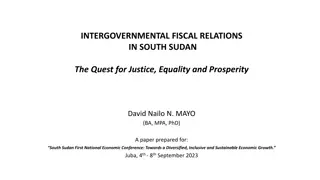OregonServes - Fiscal Grants Management
Learn about grant closeout regulations, financial management principles, administrative costs, and documentation basics for grant management. Understand how to differentiate between direct and indirect costs and provide financial reports to management.
Download Presentation

Please find below an Image/Link to download the presentation.
The content on the website is provided AS IS for your information and personal use only. It may not be sold, licensed, or shared on other websites without obtaining consent from the author.If you encounter any issues during the download, it is possible that the publisher has removed the file from their server.
You are allowed to download the files provided on this website for personal or commercial use, subject to the condition that they are used lawfully. All files are the property of their respective owners.
The content on the website is provided AS IS for your information and personal use only. It may not be sold, licensed, or shared on other websites without obtaining consent from the author.
E N D
Presentation Transcript
OregonServes Fiscal Grants Management Madeline Seghers & Alma Plasencia AmeriCorps Oregon Program Officers
Grants Management Components 1) 2) 3) 4) 5) 6) 7) 8) 9) 10) Grant Closeout Regulations & Requirements (Terms &Conditions/ OMB Super Circular) Financial Management Principles Policies & Procedures Internal Controls Administrative Costs Documenting Expenses Match Reporting & Budgeting (Amendments) Site Visits
Administrative Accounting System Requirements Distinguish grant verses non-grant related expenses Identify cost by program year & budget category Differentiate between direct and indirect costs Account for each award/grant separately Record in-kind contribution as both revenue & expense Provide management with financial reports at both the summary or detailed levels that will compare outlay with budget amounts Correlate financial reports submitted to CNCS directly to accounting information and supporting documents
Documentation Basics Why Retain Documentation? It is required by federal regulations and your contract with the state. Supports a value, cost, or performance criteria relative to the grant To track incoming information To validate information provided by staff, members and/or donors To provide evidence of accomplishments To assist during the monitoring activities, audits, or site visits No documentation may mean no credit during a review.
Documentation Basics Keep Your Documents Organized (systematically) By grant By program year By type of document Physical information: Hard copy Soft copy: CD, flash drive, server, microfilm Source: Internal to the organization External sources Should reflect appropriate review, approval, sign-off Examples: Invoices, receipts, timesheets, contracts, in-kind contribution forms, checks deposited, travel claims
Fiscal Systems AmeriCorps Grant Provisions Financial management systems must be capable of distinguishing expenditures attributable to this grant from expenditures not attributable to this grant. The systems must be able to identify costs by programmatic year and by budget category and to differentiate between direct and indirect costs or administrative costs. Record in-kind contribution as both revenues and expenses
Acceptable Match is.. Cash and in-kind contributions are accepted as part of the grantee s cost sharing or matching when contributions meet all of the following criteria: Are verifiable from the grantee s records and properly documented Are necessary and reasonable for proper and efficient accomplishment of project or program objectives Are allowable under the applicable OMB cost principles Are not paid by the Federal Government under another award, except where authorized by the Federal statute to be used for cost sharing or matching Are provided for in the approved budget (allowable under program guidelines) Conform to other grant provisions or OMB Circulars
Personnel Electronic Timekeeping System Requirements CNCS policy allows AmeriCorps State and National grantees to use electronic timekeeping systems as the system of record when three conditions are met: 1) A written policy is in effect establishing the use of electronic timekeeping system as your system of record; and, 2) A secure, verifiable electronic signature system (a) identifies and authenticates a particular person as the source of the electronic signature; and (b) indicates such person s approval of the information contained in the electronic message. 3) Once appropriate electronic signatures have been applied, no changes may be made unless there is a clear, auditable record of the revision.
Invoices Reimbursement is made based on actual expenses Reimbursements may not be for estimated, unauthorized, or unallowable expenses Invoices must be for approved and budgeted expenditures that programs have already incurred No advances allowed
Invoices Must also have up-to-date and current: 1. Member hours 2. Expense Workbooks 3. Federal Financial Reports 4. Program Reports (performance-based) Must also demonstrate compliance with program operations, i.e., no outstanding corrective action
Invoice Due Dates Invoices are due by the 21st of the month following the invoice period Effective immediately, all invoices are to be submitted electronically via OnCorps reporting system Invoices are submitted monthly
Invoice Review Only complete and approved invoices are submitted for payment we send them back if there are errors You can expect payment about 20 days after the day we receive an error-free invoice Proofread before submitting small errors will delay payment Common errors: Selecting incorrect program year for the Budget Period Don t have enough match reported Line Item Over Expended/Over Reporting of CNCS or Grantee Share (Red Numbers in your Workbook = Something is Wrong)
Budget Amendment Guidelines Budget changes of more than 10% of your total budget or to line items previously allocated $0 must not be implemented before OregonServes approves the change (i.e. don t purchase/pay for items that are not in an approved budget at the time of purchase). Adequate written justification must be provided with request changes need to be consistent with program design and activities. Budget Modification Request Form must be completed in OnCorps. Do not submit a major budget change at year-end. This indicates inadequate monitoring of budget throughout the year. There is no guarantee that a year-end change will be approved and you may not be reimbursed for these expenses.
Budget Amendment Guidelines OSC must receive written approval from CNCS for these budgetary changes: Specific costs requiring approval under the cost principles, such as: Overtime pay, rearrangement and alternation costs, and pre-award costs Purchases of equipment over $5,000 using CNCS funds, unless specified in the approved application and budget Changes in the cumulative budget line items that amount to 10% or more of the total budget, unless the CNCS share is $100,000 or less The total budget includes both the CNCS and grantee shares Grantees may transfer funds among approved direct costs categories when the cumulative amount of such transfers do not exceed 10% of the total budget
Budget Amendment Pointers Your budget = plan of expected costs Plan may change as the program is implemented Review budget monthly Request budget amendments promptly Do not wait until last month of year to request budget modification Budget is driven by program needs
Federal Financial Reports Prepare all financial reports with information from the organization s accounting system Review and reconcile the information to ensure accuracy prior to report submission Submit all reports on time Proofread before submitting Submit by April 15thand October 15th Must be submitted via OnCorps Required financial information includes: Program Income Submission of all invoices for reporting period Reporting other federal grant sources
Late Reports? Prior to the due date 1. 2. 3. By e-mail, request an extension Provide reason why an extension is needed State expected date of completion Expense Reports and FFRs Submit extension request to oregon.serves@hecc.oregon.gov HECC Finance reconciles FFRs to Expense Reports. If they do not tie, expect a call or e-mail! FFR Due Dates for the Program Year Period Claiming Date FFR Due April 15th July-March October 15th April-September
Compliance Reviews Corporation for National & Community Service (CNCS) - Improper Payments Elimination and Recovery Improvement Act (IPERIA) OregonServes (OSC)- Fiscal Desk Review Office of Inspector General (OIG) - Audit
Common Accountability Problems System of internal controls should exist on timekeeping under Uniform Grant Guidance Timesheets cannot be based on budgeted amounts actual work only Suggestion 1 periodically, conduct your own timesheet review audit Suggestion 2 provide mandatory training on how to accurately and timely maintain timesheets Organizations do not: Separate accounting records for each Federal grant Submit Federal Financial Reports (FFRs) on schedule Make sure that the FFRs reconcile to internal accounting records (general ledger) Record match dollars in general leger, with same detail/documentation as for grants expenditures Contemporaneously and adequately document source of match contributions Substantiate market value of in-kind match contributions
Questions? Madeline Seghers, Program Officer: madeline.seghers@hecc.oregon.gov HECC Finance: hecc.finance@hecc.oregon.gov
